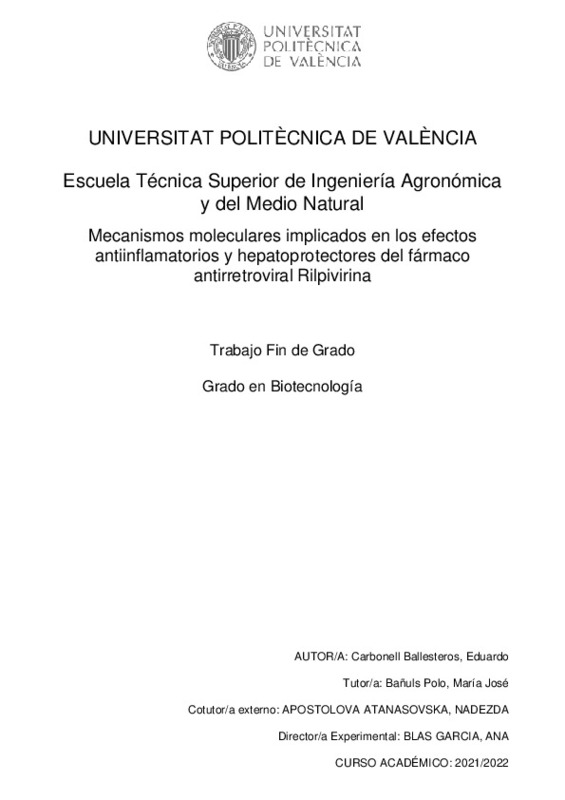JavaScript is disabled for your browser. Some features of this site may not work without it.
Buscar en RiuNet
Listar
Mi cuenta
Estadísticas
Ayuda RiuNet
Admin. UPV
Molecular mechanisms involved in the anti-inflammatory and hepatoprotective effects of the antiretroviral drug Rilpivirine
Mostrar el registro sencillo del ítem
Ficheros en el ítem
| dc.contributor.advisor | Bañuls Polo, María José
|
es_ES |
| dc.contributor.advisor | Apostolova Atanasovska, Nadezda
|
es_ES |
| dc.contributor.advisor | Blas García, Ana
|
es_ES |
| dc.contributor.author | Carbonell Ballesteros, Eduardo
|
es_ES |
| dc.date.accessioned | 2022-07-08T15:03:46Z | |
| dc.date.available | 2022-07-08T15:03:46Z | |
| dc.date.created | 2022-06-22 | |
| dc.date.issued | 2022-07-08 | es_ES |
| dc.identifier.uri | http://hdl.handle.net/10251/183970 | |
| dc.description.abstract | [ES] El reposicionamiento farmacéutico es una estrategia comercial muy común en la industria farmacéutica que consiste en el descubrimiento en fármacos ya aprobados de indicaciones alternativas a aquellas para las que estos fueron descritos inicialmente, con el atractivo de desarrollo y salida comercial más tempranos, al tener ya disponibles los datos de seguridad y eficacia de ensayos clínicos previos. Estudios previos realizados en modelos animales y cultivos celulares revelan que la rilpivirina (RPV) , un fármaco antirretroviral ampliamente utilizado en el tratamiento de las infecciones por el virus de la inmunodeficiencia humana (VIH), ejerce efectos antinflamatorios y antifibróticos. Esta acción puede ser aprovechada para la búsqueda de nuevas dianas terapéuticas para el tratamiento de enfermedades hepáticas crónicas como la enfermedad no alcohólica de hígado graso (ENAHG), una enfermedad muy común que pueden derivar en esteatohepatitis no alcohólica (ENA) y fibrosis hepática, y en última instancia producir a una enfermedad hepática terminal, como la cirrosis. Con esta evidencia, el estudio de los mecanismos moleculares responsables de los posibles efectos beneficiosos para el hígado de la RPV resulta muy interesante. A lo largo de este Trabajo de Fin de Grado se van a evaluar algunos de estos efectos en varias rutas de señalización, relevantes tanto en la inflamación como en la fibrosis hepática. Los modelos experimentales incluyen células estrelladas hepáticas primarias y células mononucleares de sangre periférica aisladas de pacientes con enfermedad hepática crónica. Los leucocitos, si bien es cierto que no residen en el hígado, pueden aportar información sobre el nivel general de la inflamación en el organismo. | es_ES |
| dc.description.abstract | [EN] Drug repurposing is a common commercial approach widely used in the pharma industry that consists in the discovery of alternative indications in already-approved drugs, with the advantage of an earlier development and commercial launch, since data of drug¿s security and efficacy is available from previous clinical trials. Previous studies performed in animal models and in cultured cells reveal that Rilpivirine (RPV), an antiretroviral drug widely used in the treatment of the Human Immunodeficiency Virus (HIV) infection, exerts anti-inflammatory and anti-fibrotic effects. This action can be exploited for the search of novel drug targets for the treatment of chronic hepatic diseases such as non-alcoholic fatty liver disease (NAFLD), a very common disease that can give rise to non-alcoholic steatohepatitis (NASH) and liver fibrosis, and ultimately leads to end-stage liver disease such as cirrhosis. With this evidence, the study of the molecular mechanisms responsible for the possible beneficial effects of RPV on the liver results very interesting. Throughout the presented Final Degree Project some of those effects will be evaluated in several signalling pathways relevant for inflammation and hepatic damage. The experimental models include primary human hepatic stellate cells (HSCs), and peripheral blood mononuclear cell (PBMCs) isolated from patients with chronic liver disease. Leukocytes, although are not present in the liver per se, can provide information about the overall inflammation status at the organism level. | es_ES |
| dc.format.extent | 35 | es_ES |
| dc.language | Español | es_ES |
| dc.publisher | Universitat Politècnica de València | es_ES |
| dc.rights | Reserva de todos los derechos | es_ES |
| dc.subject | Inflamación | es_ES |
| dc.subject | Enfermedad hepática crónica | es_ES |
| dc.subject | Fibrosis | es_ES |
| dc.subject | Rilpivirine | es_ES |
| dc.subject | Terapia Antirretroviral | es_ES |
| dc.subject | Inflammation | es_ES |
| dc.subject | Chronic Liver Disease | es_ES |
| dc.subject | Antiretroviral therapy | es_ES |
| dc.subject.classification | QUIMICA ANALITICA | es_ES |
| dc.subject.other | Grado en Biotecnología-Grau en Biotecnologia | es_ES |
| dc.title | Molecular mechanisms involved in the anti-inflammatory and hepatoprotective effects of the antiretroviral drug Rilpivirine | es_ES |
| dc.title.alternative | Mecanismos moleculares implicados en los efectos antiinflamatorios y hepatoprotectores del fármaco antirretroviral Rilpivirina | es_ES |
| dc.title.alternative | Mecanismes moleculars implicats en els efectes antiinflamatoris i hepatoprotectors del fàrmac antiretroviral Rilpivirina | es_ES |
| dc.type | Proyecto/Trabajo fin de carrera/grado | es_ES |
| dc.rights.accessRights | Abierto | es_ES |
| dc.contributor.affiliation | Universitat Politècnica de València. Departamento de Química - Departament de Química | es_ES |
| dc.contributor.affiliation | Universitat Politècnica de València. Escuela Técnica Superior de Ingeniería Agronómica y del Medio Natural - Escola Tècnica Superior d'Enginyeria Agronòmica i del Medi Natural | es_ES |
| dc.description.bibliographicCitation | Carbonell Ballesteros, E. (2022). Molecular mechanisms involved in the anti-inflammatory and hepatoprotective effects of the antiretroviral drug Rilpivirine. Universitat Politècnica de València. http://hdl.handle.net/10251/183970 | es_ES |
| dc.description.accrualMethod | TFGM | es_ES |
| dc.relation.pasarela | TFGM\149469 | es_ES |
Este ítem aparece en la(s) siguiente(s) colección(ones)
-
ETSIAMN - Trabajos académicos [3541]
Escuela Técnica Superior de Ingeniería Agronómica y del Medio Natural







